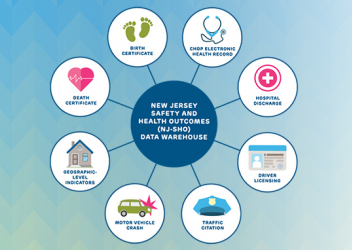Transportation Equity Research
The Center for Injury Research and Prevention at Children’s Hospital of Philadelphia collaborates with the Royal College of Physicians of Ireland, Brown University School of Public Health, the Stuart Weitzman School of Design at the University of Pennsylvania, and other research organizations to conduct traffic transportation equity research.
Transportation equity research focuses on identifying and addressing barriers to reliable transportation for improving health outcomes and reducing health disparities, one of five non-medical priority areas for improving health as part of the Accountable Health Communities Initiative sponsored by Medicare and Medicaid. More than 3.6 million Americans miss or delay healthcare because of transportation barriers, and this lack of access to care can lead to serious short-term and long-term health issues. Transportation equity research also includes looking at disparities in access to driver licensing and training.
Research Projects
- Applying Individual and Residence-Based Equity Measures to Characterize Disparities in Crash Outcomes
This study sought to provide a deeper understanding of inequalities in traffic safety. Using data from the New Jersey Safety and Health Outcomes (NJ-SHO) Data Warehouse, CIRP researchers examined differences in the risk of all crashes and injury crashes among drivers living in New Jersey. Drivers who live in lower opportunity neighborhoods and people of minoritized race and ethnicity groups were more likely to be involved in injury crashes and all crashes. These findings emphasize the need to consider a person’s lived experience when assessing their crash risk and a path to reducing disparities in traffic safety. The study was published in the Journal of Safety Research.
Read a blog post about the research.
Principal Investigators: Kristi Busico Metzger, PhD, MPH; Romario Smith, MPH, MSW; Sara A. Freed, PhD; Emma Sartin, PhD, MPH; Melissa Pfeiffer, MPH; Lauren O'Malley, MPH; Allison E. Curry, PhD
Funding: Eunice Kennedy Shriver National Institute of Child Health and Human Development, New Jersey Division of Highway Traffic Safety
- Impacts of Non-Driving-Related License Suspensions on Quality of Life: A Qualitative Study
CIRP researchers conducted rigorous semi-structured phone interviews with 14 adults between September 2020 and January 2021. Participants had a non-driving-related license suspension and were primarily recruited through community partners. A directed content analysis approach informed the development of the coding scheme. Coded transcripts were reviewed to identify themes.
The findings, published in Applied Research in Quality of Life, reveal wide-reaching consequences of license suspensions cascading over time when prolonged. Over and above a person's ability to find and maintain employment, these suspensions take away independence, strain relationships, and negatively impact health, including increasing depression and anxiety symptoms and promoting the start or relapse of substance abuse problems. Many people interviewed for the study also believe that these policies are examples of systemic racism and classism.
Read a blog post about the research.
Principal Investigators: Emma Sartin, PhD, MPH; Dominique G. Ruggieri, PhD; Adrian Diogo, MPH; Lauren O'Malley, MPH; Lakhaya London, MPH; Allison E. Curry, PhD
Funding: Eunice Kennedy Shriver National Institute of Child Health and Human Development; Division of Emergency Medicine, Division of Pediatrics, Perelman School of Medicine at the University of Pennsylvania
- Transportation Equity, Health and Aging: A Novel Approach to Healthy Longevity with Benefits Across the Life Span
There is a need for a balanced medical perspective when assessing fitness to drive, one that can appropriately weigh actual safety risks against the real health consequences of restricting mobility. A partnership between the fields of health care and transportation could facilitate this balance. More sophisticated, individualized approaches and modeling are becoming available and could allow for personalized prevention that optimize outcomes not only for older adults, but also across the life span. In a commentary for the National Academy of Medicine (NAM), researchers seek to promote a culture that ensures our future well-being by encouraging physicians to support safe transportation as a key determinant of health and social inclusion.
Read a blog post about the research.
Principal Investigators: Desmond O’Neill, MD; Elizabeth Walshe, PhD; Dan Romer, PhD; Nina R. Joyce, PhD; Andrew R. Zullo, PharmD, MPH; Jasjit S. Ahluwalia, MD; Melissa Pfeiffer, MPH; Allison E. Curry, PhD, MPH
Funding: Children’s Hospital of Philadelphia
- Individual and Geographic Variation in Driver's Suspension: Evidence of Disparities by Race, Ethnicity, and Income
Using data from the New Jersey Safety and Health Outcomes (NJ-SHO) Data Warehouse 2004-2018, researchers from Brown University School of Public Health and CIRP compared characteristics of suspended drivers, their residential census tract, and access to public transportation and jobs, by reason for suspension (driving or non-driving-related). Their findings, published in the Journal of Transport & Health, show that the vast majority (91%) of license suspensions were for non-driving-related (NDR) events, with the most common reason for a suspension being failure to pay a fine.
The study also found that these NDR suspensions disproportionately affect people living in low-income neighborhoods and in neighborhoods with a high proportion of Black and Hispanic residents. Almost half (45%) of these NDR suspensions occurred in 2018. Future research will explore how these NDR suspensions may negatively affect health and economic well-being, particularly among individuals and communities already facing other barriers to employment and healthcare.
Read a blog post about the research.
Principal Investigators: Nina R. Joyce, PhD; Allison E. Curry, PhD, MPH
Funding: Agency for Healthcare Research and Quality; Department of Veterans Affairs Office of Academic Affiliations in Health Services Research and Development; Eunice Kennedy Shriver National Institute of Child Health and Human Development; Centers of Biomedical Research Excellence
- Vehicle Safety Characteristics in Vulnerable Driver Populations
This study, published in Traffic Injury Prevention, highlights important disparities in vehicle safety features among drivers by age and income. The researchers analyzed data from the NJ Safety and Health Outcomes Data Warehouse, which includes all crash and licensing data for the state of NJ from 2010-17 and used NHTSA’s Product Information Catalog and Vehicle Listing platform to decode the VIN of each crash-involved vehicle to obtain model year, presence of electronic stability control (ESC), vehicle type, engine horsepower, and presence of front, side, and curtain airbags. They found that teens, older adults (age 65+), and those from low-income neighborhoods are more likely to be driving vehicles that are less safe, putting them at greater risk of injury and death in the event of a crash.
Read a blog post about the research.
Principal Investigators: Kristi Busico Metzger, PhD, MPH; Allison E. Curry, PhD, MPH
Funding: Eunice Kennedy Shriver National Institute of Child Health and Human Development
- Driver’s License Suspension Policies as a Barrier to Health Care
CIRP researchers are partnering with researchers from Brown University School of Public Health to address barriers to reliable transportation for improving health outcomes and reducing health disparities. In 43 states courts can suspend a driver’s license for non-driving-related (NDR) events, such as failure to pay a fine or appear in court. Evidence suggests that NDR suspensions are disproportionately imposed on low-income and racial and ethnic minority drivers who are already more likely to face other barriers to care. In an editorial published in the American Journal of Public Health, researchers explain the impact of a suspended license on access to health care and what must be addressed to improve transportation equity in this area.
Read a blog post about the editorial.
Principal InvestigatorsXiaoxia Dong: Nina R. Joyce, PhD; Andrew R. Zullo, PharmD, MPH; Jasjit S. Ahluwalia, MD; Melissa Pfeiffer, MPH; Allison E. Curry, PhD, MPH
Funding: Agency for Healthcare Research and Quality; Department of Veterans Affairs Office of Academic Affiliations in Health Services Research and Development; National Institute on Aging; Eunice Kennedy Shriver National Institute for Child Health and Development; Centers of Biomedical Research Excellence
- Facilitating Research On Racial and Ethnic Disparities and Inequities in Transportation: Application and Evaluation of the Bayesian Improved Surname Geocoding (BISG) Algorithm
CIRP researchers recently explored the accuracy of an algorithm to estimate race and ethnicity in transportation research datasets. Their findings, published in Traffic Injury Prevention, suggest that the Bayesian Improved Surname Geocoding (BISG) Geocoding algorithm is a promising method to incorporate race and ethnicity for the four largest racial/ethnic groups in population-level crash, licensing, and other transportation databases via use of collected name and address data, regardless of whether these data are linked to external sources with known race and ethnicity information.
Taken with previous studies, their findings suggest that applying BISG to traffic safety analyses may also reduce potential biases commonly found in data collection and analysis, ultimately promoting more effective traffic safety interventions and equitable policies.
Read a blog post about the research.
Principal Investigators: Emma Sartin, PhD, MPH; Kristi Busico Metzger, PhD, MPH; Melissa Pfeiffer, MPH; Rachel K. Myers, PhD, MS; Allison E. Curry, PhD, MPH
Funding: Eunice Kennedy Shriver National Institute for Child Health and Development
- Variation in Drivers' Seat Belt Use By Indicators of Community-Level Vulnerability
Examining crash reports with linked community-level indicators may optimize efforts aimed at improving traffic safety behaviors, like seat belt use. This study, published in the Journal of Safety Research, found that not wearing a seat belt is 121% more prevalent in communities with the largest percentage of the population living with three or more indicators of vulnerability than those in the least vulnerable communities. More community-level research is needed to help inform the development of tailored and evidence-based strategies and resources for those most at risk.
Read a blog post about the research.
Principal Investigators: Emma Sartin, PhD, MPH; Leah Lombardi, MPH; Kristi Busico Metzger, PhD, MPH; Rachel K. Myers, PhD, MS; Melissa Pfeiffer, MPH; Allison E. Curry, PhD, MPH
Funding: Eunice Kennedy Shriver National Institute of Child Health and Human Development















